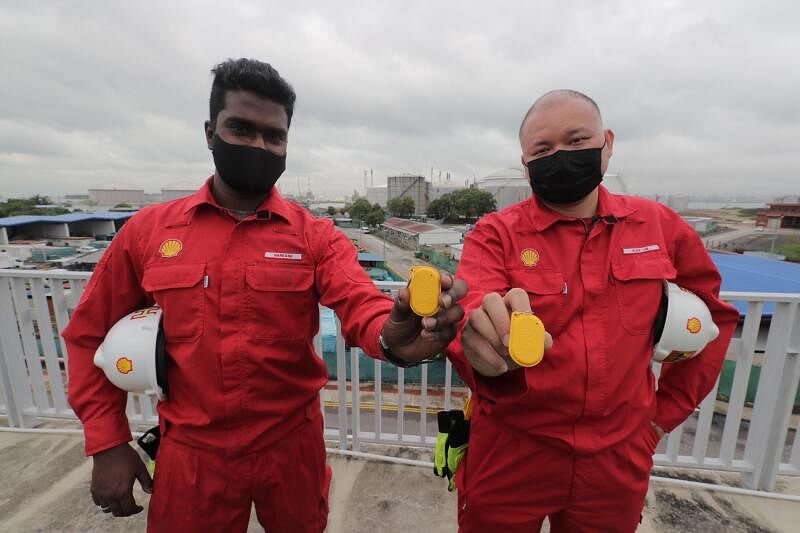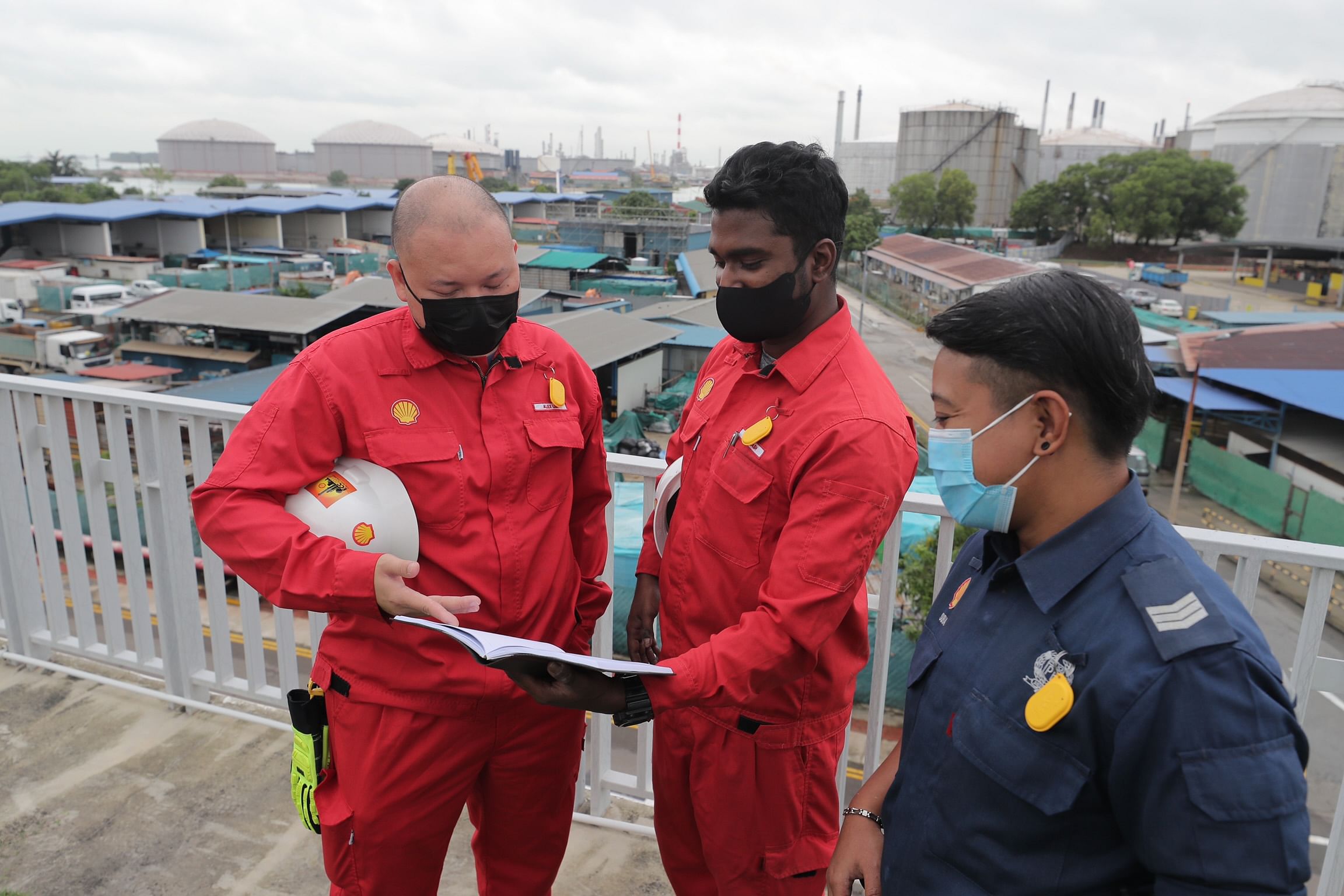Workers in S'pore industries using flammable gas get special contact tracing devices
Sign up now: Get ST's newsletters delivered to your inbox

The tokens work in the same way as Trace Together tokens.
ST PHOTO: GAVIN FOO
SINGAPORE - Shell has started a digital contact tracing pilot that involves the use of a customised Bluetooth token designed to work safely in areas where flammable gases are present.
Some 4,000 Shell process workers and visitors at its Pulau Bukom manufacturing site will receive the BluePass tokens, allowing them to be tracked everywhere on the site. Previously, digital contact tracing was not possible in areas with traces of flammable gases.
The tokens - which were developed by Temasek-owned cryptographic technology firm D'Crypt - work in the same way as Trace Together tokens, tracking close contacts by reading Bluetooth signal strengths.
While the BluePass tokens have yet to be officially certified as intrinsically safe (IS), Shell has done its own internal evaluations to ensure that the devices are safe for use. The IS label denotes equipment that cannot cause the ignition of flammable material, and workers cannot bring non-IS certified equipment into certain work-sites.
It is for the same reason that the process workers cannot bring in the usual TraceTogether tokens or mobile phones with contact tracing apps.
Before using BluePass, Shell had to rely on "pen and paper" methods for contact tracing, said D'Crypt chief executive Antony Ng.
D'Crypt had to reduce the standard battery size by about half to ensure that the devices will not cause an explosion.
"If the device carries very little energy... the chance that it will spark or ignite is, of course, lower," said Dr Ng.
The devices are designed to be strapped onto wrists so that they can be worn constantly to reduce electrostatic discharge, and the modified ones are made even sleeker so workers can easily put them on.
A Shell spokesman said that the tokens will be distributed in phases, and if the pilot is successful, there are plans to expand the distribution to its other Shell sites in Singapore.
"By equipping our workers and visitors with the modified BluePass tokens, we can enable fast, complete and accurate contact tracing for targeted intervention, which also serves to reduce workforce anxiety," said the spokesman.
So far, close to 500,000 BluePass tokens have been sent out by D'Crypt, with most going to workers in the construction, marine and process sectors, and to migrant workers living in dormitories.
With BluePass, employers have direct oversight of the data in these devices and can quickly and effectively quarantine close contacts of confirmed Covid-19 cases to minimise disruption to their businesses.
The Government Technology Agency, which developed the TraceTogether token and SafeEntry, does not provide companies with the data it collects, for confidentiality reasons.
The Straits Times understands that the authorities could take about a day or half a day to inform companies of the infected individuals and their close contacts. As a precaution, most firms quarantine their entire facility while waiting for the information.

Shell employees at Pulau Bukom Manufacturing Site with D’Crypt’s specially modified BluePass contact tracing device for safe use at the process areas, 11 Jan 2021.
PHOTO: ST
Consultancy firm Surbana Jurong is also using BluePass for swift contact tracing of workers at its construction sites.
Dr Ng added that the token technology has been used to trace the close contacts of "quite a lot" of Covid-19 cases.
It takes just 10 to 15 minutes to download the encrypted data from the affected worker's device, and for an automated system to identify and churn out a list of the worker's close contacts.
This helps in ensuring a "surgical quarantine", as a company can almost immediately target the worker's close contacts and shut down operations in affected areas, instead of having to shut all its operations while it awaits directions from authorities, Dr Ng said.
This means that instead of shutting down an entire building because of one infected worker, the company has to shut down only an affected floor or even just half the floor, he said.
The BluePass tokens also interact with Trace Together tokens and the app, and such data is passed on to the authorities when a Covid-19 case is confirmed.
However, Dr Ng stressed that companies have access to only the BluePass data of their own employees, and cannot see the BluePass data of workers from other companies or the Trace Together data from the public.
He added that there is scope for the tokens to be used in other scenarios, such as for events like weddings.
The company has also worked on ensuring that the tokens can be adapted to the constantly evolving Covid-19 situation.
For example, with the new highly transmissible strain of Covid-19 from Britain, D'Crypt has looked into shortening the "scan interval" of devices, so that the tokens can capture more data about a worker's interactions. This will account for the possibility that the virus can be transmitted even during very short interactions, said Dr Ng.
He added that it is important to remain adaptable and to "future-proof" the devices.
"It is wrong to assume that Covid-19 is a stationary target - it isn't."
How the Bluepass Token works
Similar to the TraceTogether token, the BluePass token is powered by battery, and records close contacts via the Bluetooth signal strength of other nearby Bluetooth contact-tracing devices or apps.
It logs the proximity data of nearby BluePass or TraceTogether users every five to 10 minutes. It does not track users' whereabouts.
All data is stored in an encrypted form on the individual token, and when a Covid-19 case is confirmed, the patient will be asked to trigger the download of data from the device by physically pressing a button on it.
From there, a back-end system decrypts the data and employers can identify the close contacts of the case from the token's data.
Each token is linked to a contact number, and the last four characters of the user's NRIC, FIN or passport number.
It can last for up to 12 months, or six months for the modified versions.
The BluePass token keeps records of the worker's "interactions" for 63 days, or three disease cycles, after which the new records will overwrite the old ones.
In contrast, the TraceTogether app or token keeps records of users' interactions with other Bluetooth devices for 25 days. Bluetooth data older than 25 days is erased.


